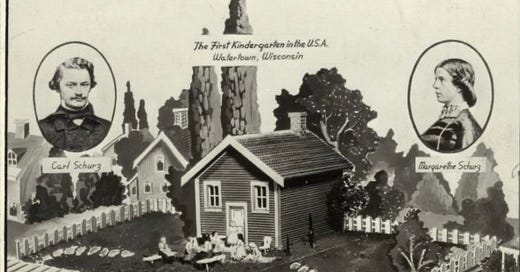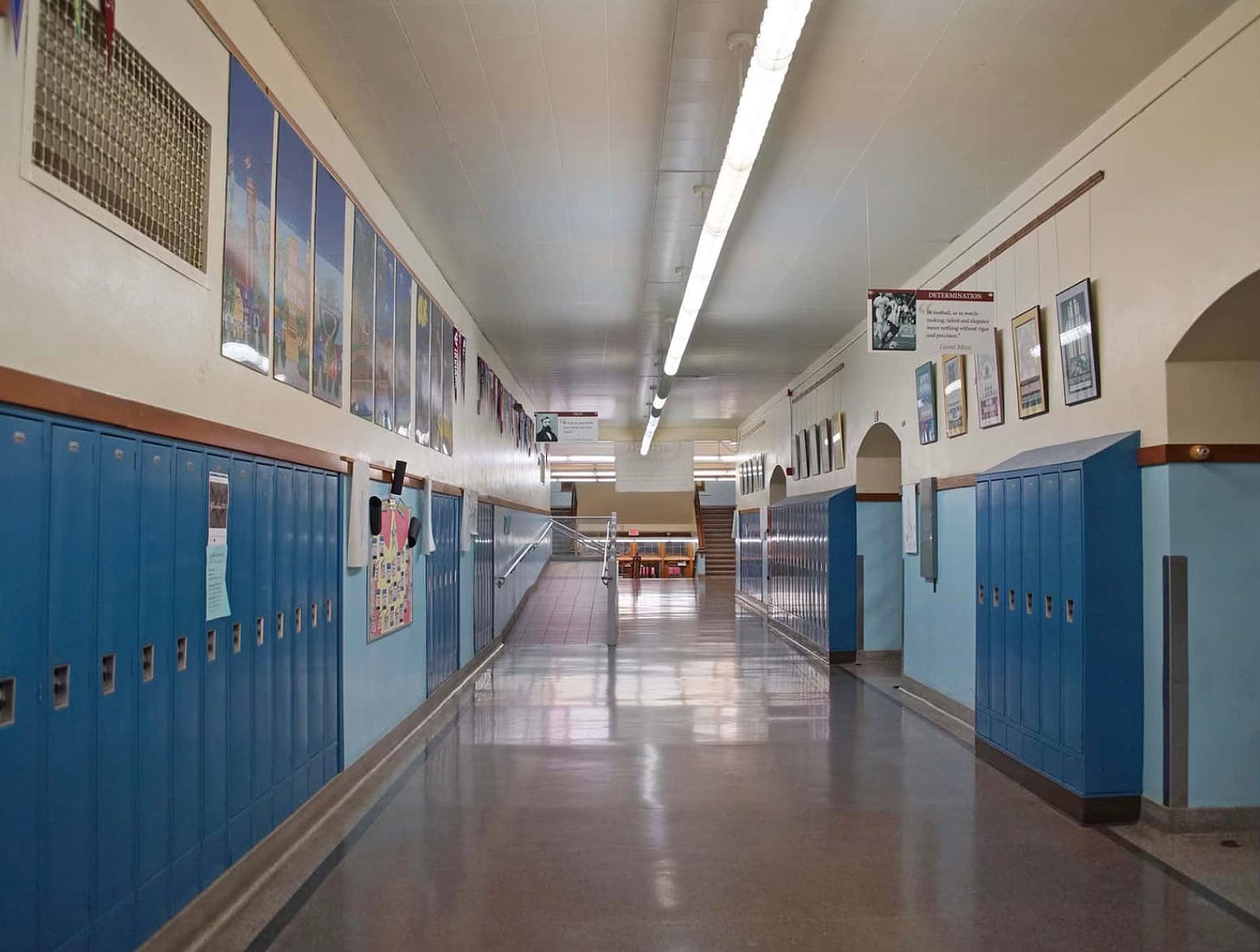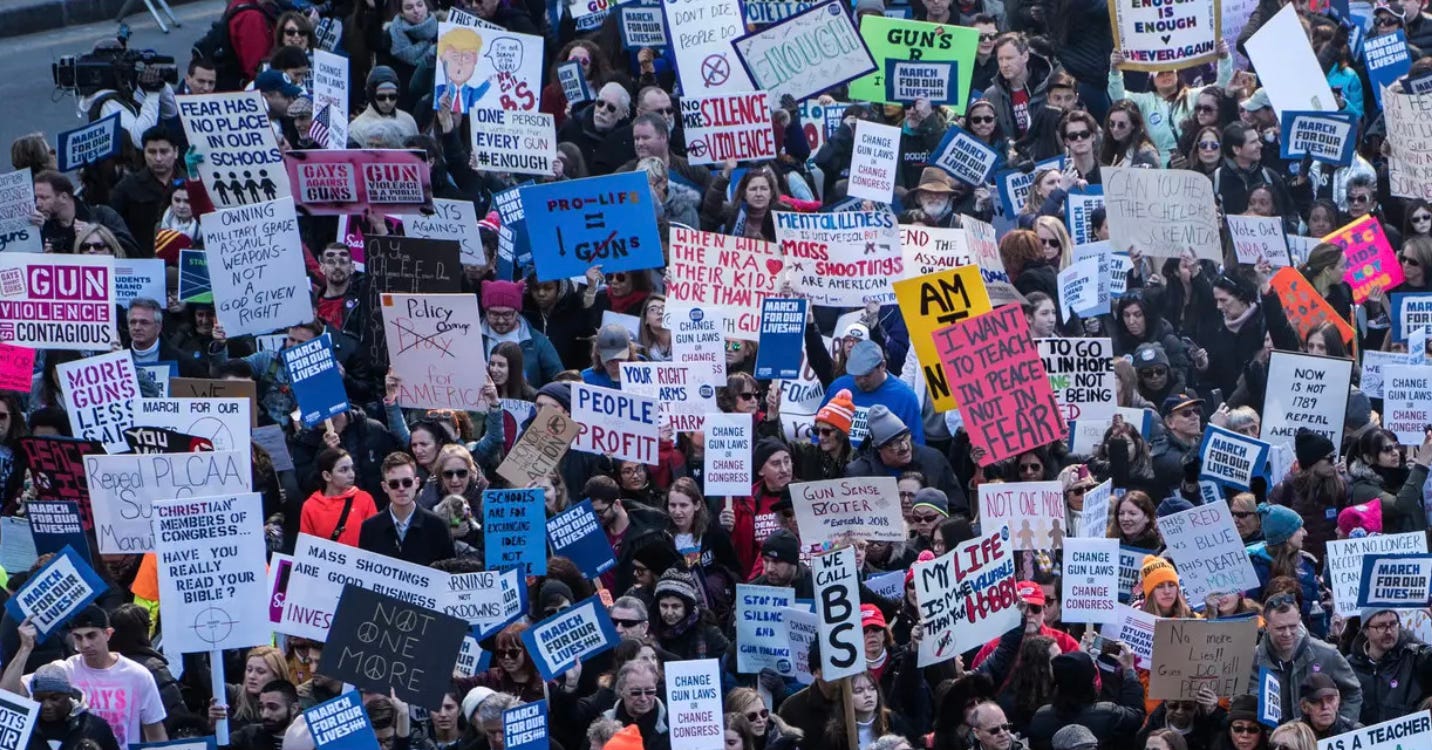How to talk to your sixth-grader about why our country doesn't love its children
We only had a code red. Ninety minutes down the road, the news was a million times worse.
A sixth grader is not very old. They are young enough that, as their parent, you can still vividly remember when the things that made them scared weren’t very scary at all. You remember when they were an infant and were startled by loud noises. You remember when they were a toddler and they believed in monsters in the basement. You remember when they first went off to school and were terrified that they wouldn’t make any friends.
“It’s ok,” you would say, or even bolder, “there’s nothing to worry about.” You would reassure them that you’d always be there, that you’d always keep them safe. You would mean it.
Yesterday, I was working on a different essay. It was about a billionaire, a major investor behind most of the Internet, including this platform. The billionaire used to donate to Democrats, but now he was a proud Trumper. He gave an interview recently, over two hours long. He was so pleased with himself. “It is morning in America again,” the billionaire remarked giddily. He talked about how, back when he came of age in the ‘90s, there used to be something called “the deal,” People like him used to be lionized for what they built. They got to make as much money as they wanted, have their face emblazoned on magazine covers, and then be thanked for their philanthropy. He was livid that we had broken that deal, that society was no longer grateful for the wisdom of our betters. Fortunately, he assured the interviewer, those days were behind us.
At one point in the interview, the billionaire talked about how he too used to oppose Trump, but that was, in part, because he had been influenced by too many years living in California. The billionaire was originally from Wisconsin, you see. He kind of trailed off, but the point was clear. Now that he was a MAGA guy, he had reconnected with his roots. The heartland dwellers loved Trump and hated the elites, so he was now one of them. He got it. If you were a downtrodden real American, he was on your team now. There would be no pronouns in his email signature, thank you very much, just a billion dollars in his pocket and A.I. in the portfolio.
Unlike that billionaire, I still live in Wisconsin. Today in the heartland, the text chain with the other middle school parents started popping off around 2:00 PM. “There’s a code red at the school.” Before long, other news started trickling in. There was a picture on social media, a kid outside, pointing a gun directly at the building. The details were fuzzy, and would remain so. Maybe it was a threat. Maybe it was a prank. Maybe there was a plan. It all feels the same when the announcement goes out over the loudspeaker.
By that point in the day, we had already gotten the news alerts on our phone that, ninety minutes away from us, there had been a shooting at a school in Madison. Three dead, including the shooter. Six injured. I refreshed the news, first once then a hundred times. There were no headlines about my son’s school, which lowered my heart rate a bit. We may have become numb to school shootings in this country, but we at least still report on them. No news means no shots fired, at least inside the building.
Thank God that assumption was correct, at least in our case. Just an ordinary, average, bone-chilling code red, perhaps like one that your child has experienced. Holy hell that it’s not always the case, even today, just miles away. Back in Madison, a dad arrived at the hospital where the victims had just been delivered. He clutched his head in his hands and just kept repeating the same lamentation. “I’m not ok, I’m not ok, I’m not ok.” Here in Milwaukee, I was a million times luckier. The sixth grader in my household came home in a daze, but he came home. Oh my god he came home.
A sixth grader isn’t old, but neither are they young. They are old enough that you can’t just say “it’ll all be all right” or “I’ll always keep you safe” and have them believe you. My son and his classmates already knew about the Madison shooting when they huddled in a storage room. They knew what a code red meant because they’d practiced them for years. They knew more than that, though. They knew that, in the city and country where they live, death comes too soon for all sorts of awful reasons— bullets, yes, but not just bullets. Death comes from seeds planted generations back. Death comes on the roads. Death comes from abandoned factories. Death comes from the water and the air. Death comes from the surgery your uncle couldn’t afford, the good paying job your mom can’t find, or the cop you ran into on the wrong day.
The majority of my son’s classmates come from working class Black and Brown neighborhoods, places that the billionaire now feels a sudden kinship with because Trump didn’t do as poorly there as other Republicans normally do. As it turns out, I chose the wrong day to spend that much unfiltered time with that particular interview. Now I was riled up. What the hell does this vainglorious king of the world know about their lives?
It isn’t fair, I suppose, that I’ve directed most of my righteous parental angst and rage at this smug billionaire and his Reaganite victory lap. He didn’t have anything to do with what happened today. He wasn’t the broken kid who held an entire school hostage.
But damnit, what an eloquent symbol of the egotistical puffery that distracts us from building a world where every kid goes to bed safe and sound. Think about all the ink that has been spilled recently on various full-of-sound-and-fury-signifying-nothing debates. “Has woke gone too far?” “Have Democrats lost the multi-racial working class because they made everybody say Latinx?” “Is Bluesky an echo chamber or the vanguard of a social media revolution?”
Is that really what people think matters? In a country where the kids who hide in supply room are the lucky ones?
Absolutely, as it turns out. For two hours straight, the billionaire and his interviewer– she of the very successful news outlet that specializes in histrionics about how the woke mob has gone too far– kept fawning over one another. They agreed that an important cultural tide had turned. “Aspen” and “Davos” were name-dropped on multiple occasions. They argued, implicitly, that the way powerful people talk to one another matters, that the most important question to the future of our republic is whether they and their friends are sufficiently praised by The Atlantic and The New Yorker.
You all, I don’t care! Not just about whatever ego fulfillment quest those two masters of the universe are on about, but also the vast majority of nonsense that passes for political discourse these days. I don’t care about whether you went to a poorly facilitated diversity and equity training in 2017 or if a Cultural Studies major from Sarah Lawrence was overly performative online. I don’t care how much smarter you are than other people. I don’t even care whether your politics flatter my own. Does any of that keep our kids alive, living better lives, enveloped in the love they deserve?
As a parent whose child hid in a storage room on the same day that other kids didn’t come home at all, this is where I’m supposed to say “it’s the guns, damnit.” And yes, of course. I’m no fan.
It is the guns, but it isn’t just the guns. Or put differently, guns do kill people, but America kills far more people, in so many ways.
The kid who caused the code red at my son’s school was no doubt in a great deal of pain. And that kid lives in a country where pain is often not healed, but balled up and passed on to somebody else. We are a country where some sleep on the streets so that others can sleep in comfort. We are a country where chanting “mass deportations now!” can win you a multiracial electoral coalition. We are a country where “it takes a village to raise a child” has been repeated enough to be trite, but where we forget its twin proverb
“The child who is not embraced by the village will burn it down to feel its warmth.”
A sixth grader isn’t that old, but they’re getting older by the day. They’re still small enough to want to cuddle their dad when they’re both scared, but they’re far too big to hold in one arm anymore. There’s a metaphor there. Son, I adore that you still look to me to protect you from the world’s harms, and oh my God how I wish that the sheer force of my love were enough, but you and I both know that we’re going to need help.
There’s that village, again. We need each other. Urgently. So why are we talking about anything else?
Last night, the conversation between my son and I turned, as it often does, towards the people in our community who care so vividly and beautifully that it bursts our hearts. You should have seen the teachers in my son’s school. A bunch of goddamn heroes. He was in band class when the code red was called. The band teacher is in her third trimester. I can only imagine what she was feeling. And yet, she expertly comforted her nervous tween flock, fielded texts from colleagues and then, when the code was downgraded to yellow, knew instinctively that music would help. The sixth grade band played on, tentatively at first, until their hearts beat a little less chaotically.
We have so much to build from, us dreamers of a better world, but only if we actually made that building the work of our collective lifetime.
I am still so angry at that billionaire, by the way. He could care about so much and yet he has decided to care about so little. I know though that, as is so often the case, that anger is a mask for sadness and shame. I recognize that I too am often more concerned about ego gratification and pablum than I am in the lives and livelihoods of all the children around me.
It took me longer than usual to fall asleep last night. As I lay awake, I repeated Ruth Wilson Gilmore’s most famous line to myself like the chorus to a hymn.
“Where life is precious, life is precious.”
“Where life is precious, life is precious.”
“Where life is precious, life is precious.”
And then, another line I return to frequently, one I shared in an essay just two weeks previously.
“We have all the time in the world, but none to spare.”
A sixth grader is old enough that you can be honest with them. They are old enough that they can be honest with you. Last night, my sixth grader and I stared each other in the eyes and he told me that he was so scared and sad and angry and that he didn’t know if he wanted to go to school today.
It took me a while to finally know what to say in response.
I had to sit with his sadness for a second, as well as my own anger and befuddlement and fear that time may be slipping away too quickly.
I doubt that my words were perfect, but I knew, at the very least, that I could say them with my whole heart.
“I love you, bud, and I’m not the only one. So many people love you and your classmates. We just have so much more work to do to show it.”
END NOTES (will keep it brief this week):
Please hold the families of Abundant Life Christian School in Madison, Wisconsin in the light after yesterday’s horrific shooting. I chose to foreground our school’s story, because it’s the only one I can speak to first-hand. I hope that in doing so I didn’t infer that our experience today, which was merely scary, is anything close to the heartbreak that community is experiencing right now.
My writing (and my trainings at The Barnraisers Project) are my full-time job, which means that this newsletter is both how I support my family as well as my primary means of subsidizing all the training and coaching I offer to community organizers and better-world-builders across the country (including many parents whose activism centers America’s gun violence epidemic— hi friends, and thank you). For a whole lot of reasons, I believe in offering those trainings (and the vast majority of my writing) for free, but I can’t do that without folks who read here for free raising their hand and saying “hey, I appreciate this work and this writing and I’m happy to pitch in a few bucks.” Thank you, sincerely, for considering doing so. I promise that I don’t take the ask lightly, and that I’ll be a good steward of your kind contribution (oh, and if for end of year giving reasons, you prefer to give to a tax deductible nonprofit, if you donate to Barnraisers and let me know, I’ll happily comp your subscription here).
With all that said, while I often set comments to paid subscriber only when I write about my family, I have a hunch that the “there was a code red today” experience is one that many of us share, so I’ve left them public today. Love you all.







Unfortunately, my child is a survivor of a school shooting. She was safe, but several of her classmates died, and her high school graduation was largely a memorial service. A few things my kids have taught me about a childhood trauma they should not have had to face.
- The media attention (appropriate, this is news) was really difficult. A swarm of seasoned reporters were camped out looking for soundbites and interviews for days and days after the shooting. My teens felt that their grief and horror was being exploited for entertainment. Anyone reporting should tread softly the line between reporting and sensationalizing.
- The kids needed time to grieve together. Their school was closed for weeks after the shooting and they spent a lot of time in one kid's basement with no parents around to process their grief in their own way, communally. They didn't really want to be in the school, but they did want to be with each other and there aren't a lot of 'third spaces' for kids these days (esp with reporters lurking around). Give them space, check on them occasionally, send lots of snacks down.
- Adults lost a lot of credibility. Like, rightfully so. After failing them so spectacularly, it was really difficult for my kids to trust in adults ability to do anything right, and they do not accept any platitudes. Parents, teachers, administrators, politicians and police are not trusted elders, we're just people trying to keep them ignorant of dangers we won't protect them from. The hierarchy of authority that underpinned the child-parent dynamic was irreparably damaged.
I don't know if any of this is helpful to anyone, but when people get to talking about the latest tragedy, I always want to center the experiences of the kids whose lives are changed forever, not the noisy people making noise about What Needs To Be Done.
Weighing in from Madison... yesterday was a GD surreal day. The initial panic that there'd been a shooting, desperately checking around online to make sure my son's school was safe, checking in with friends and other parents... finding out a friend lives next to the shooter's house and her life was upended due to the search, hearing from friends on that side of town whose kids are way more upset than my own...
But there was also grace and community. We attended a Mutual Aid dinner and met a bunch of great people, some of whom know other great people in our lives and further filled in a network of community we didn't know we had.
Thank you for your words once again, Garrett.